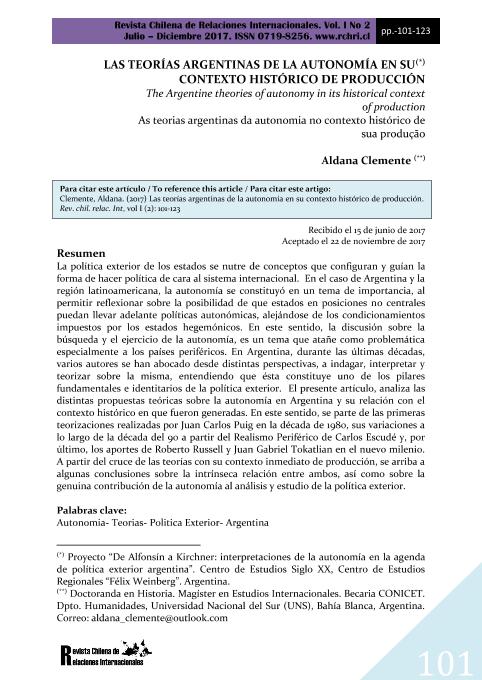Mostrar el registro sencillo del ítem
dc.contributor.author
Clemente, Aldana

dc.date.available
2018-05-02T17:26:22Z
dc.date.issued
2017-12
dc.identifier.citation
Clemente, Aldana; Las teorías argentinas de la autonomía en su contexto histórico de producción; Sociedad de Historia de Valparaíso; Revista Chilena de Relaciones Internacionales; I; 2; 12-2017; 101-123
dc.identifier.issn
0719-8256
dc.identifier.uri
http://hdl.handle.net/11336/43873
dc.description.abstract
La política exterior de los estados se nutre de conceptos que configuran y guían la forma de hacer política de cara al sistema internacional. En el caso de Argentina y la región latinoamericana, la autonomía se constituyó en un tema de importancia, al permitir reflexionar sobre la posibilidad de que estados en posiciones no centrales puedan llevar adelante políticas autonómicas, alejándose de los condicionamientos impuestos por los estados hegemónicos. En este sentido, la discusión sobre la búsqueda y el ejercicio de la autonomía, es un tema que atañe como problemática especialmente a los países periféricos. En Argentina, durante las últimas décadas, varios autores se han abocado desde distintas perspectivas, a indagar, interpretar y teorizar sobre la misma, entendiendo que ésta constituye uno de los pilares fundamentales e identitarios de la política exterior. El presente artículo, analiza las distintas propuestas teóricas sobre la autonomía en Argentina y su relación con el contexto histórico en que fueron generadas. En este sentido, se parte de las primeras teorizaciones realizadas por Juan Carlos Puig en la década de 1980, sus variaciones a lo largo de la década del 90 a partir del Realismo Periférico de Carlos Escudé y, por último, los aportes de Roberto Russell y Juan Gabriel Tokatlian en el nuevo milenio. A partir del cruce de las teorías con su contexto inmediato de producción, se arriba a algunas conclusiones sobre la intrínseca relación entre ambos, así como sobre la genuina contribución de la autonomía al análisis y estudio de la política exterior.
dc.description.abstract
The foreign policy of the states is nourished of concepts that form and guide the way of doing politics with a view to the international system. In case of Argentina and the Latin-American region, the autonomy was constituted in a topic of importance, on having allowed to think about the possibility of that been in not central positions could take forward autonomous policies, moving away from the conditionings imposed by the hegemonic states. In this respect, the discussion on the search and the exercise of the autonomy is a topic that concerns as problematics specially to the peripheral countries. In case of Argentina, from the last decades, different authors have approached from different perspectives to investigating, when the concept interpreted and to theorize autonomy, understanding that the same one constitutes one of the fundamental props of the foreign policy. The present article, analyzes the different theoretical offers on the autonomy in Argentina and his relation with the historical context in which they were generated. In this respect, we will first analyze the perspective of Juan Carlos Puig in the decade of 1980, his variations throughout the decade of 90 with Carlos Escudé and the Peripheral Realism and finally, the contributions of Roberto Russell and Juan Gabriel Tokatlian in the new millenium. From the crossing of the theory with the history, one will arrive at some conclusions about the genuine contribution of the autonomy at the analysis and study of the foreign policy.
dc.format
application/pdf
dc.language.iso
spa
dc.publisher
Sociedad de Historia de Valparaíso
dc.rights
info:eu-repo/semantics/openAccess
dc.rights.uri
https://creativecommons.org/licenses/by-nc-nd/2.5/ar/
dc.subject
Autonomía
dc.subject
Teorías
dc.subject
Política Exterior
dc.subject
Argentina
dc.subject.classification
Historia

dc.subject.classification
Historia y Arqueología

dc.subject.classification
HUMANIDADES

dc.title
Las teorías argentinas de la autonomía en su contexto histórico de producción
dc.title
The Argentine theories of autonomy in its historical context of production
dc.title
As teorias argentinas da autonomia no contexto histórico de sua produção
dc.type
info:eu-repo/semantics/article
dc.type
info:ar-repo/semantics/artículo
dc.type
info:eu-repo/semantics/publishedVersion
dc.date.updated
2018-04-16T17:43:58Z
dc.journal.volume
I
dc.journal.number
2
dc.journal.pagination
101-123
dc.journal.pais
Chile

dc.journal.ciudad
Valparaíso
dc.description.fil
Fil: Clemente, Aldana. Consejo Nacional de Investigaciones Científicas y Técnicas. Centro Científico Tecnológico Conicet - Bahía Blanca; Argentina. Universidad Nacional del Sur. Departamento de Humanidades. Centro de Estudios Regionales; Argentina
dc.journal.title
Revista Chilena de Relaciones Internacionales
dc.relation.alternativeid
info:eu-repo/semantics/altIdentifier/url/https://rchri.cl/articulo/las-teorias-argentinas-de-la-autonomia-en-su-contexto-historico-de-produccion/
Archivos asociados
